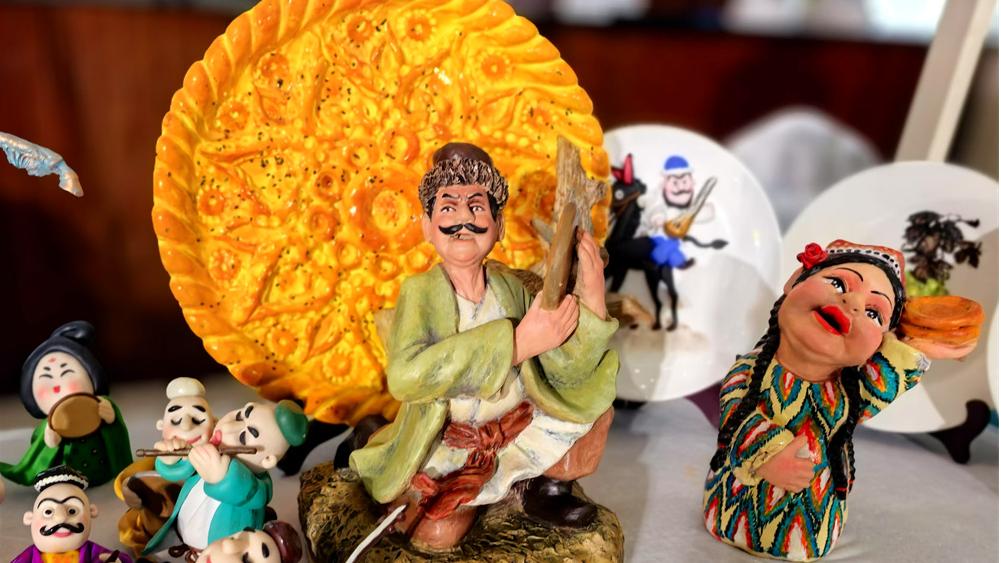Giray Fidan: Chinese classics never die
Ankara is known to be a cultural center of Türkiye, and the ancient Ankara Castle overlooks a city that is filled with quaint houses, artisan shops, and historical museums. Giray Fidan, professor in the Department of Eastern Languages and Literatures at Ankara Hac? Bayram Veli University, has been working on Chinese literature and history for the last 20 years. He believes in the power of literature in bringing readers together and hopes more scholars from both China and Türkiye will work on translation in the future, facilitating cultural exchanges between these two countries.

Giray Fidan (Photo/Patrick Shead-Simmonds)
As a sinologist, Fidan explained, "I am responsible for translating Chinese books faithfully and translation contributes to Turkish culture. It is very important to let Turkish readers understand the rich culture and history of China. There were two times more books in China compared to the entire globe in the 17th century. This knowledge does not just belong to China, but humanity as a whole. It is therefore important to translate Chinese literature into different languages, including Turkish."
Fidan translated many Chinese classics, including "Zhuangzi", "The Analects of Confucius", and "Guiguzi", as well as some modern literature like "The Cat Country". One of Fidan's bestsellers was "The Art of War", and it sold over 400,000 copies and was reprinted 27 times; the 27th time just came out this summer. Currently, he is working on a translation of "The Dream of the Red Chamber", another Chinese classic.
One of Fidan's most popular translations in Türkiye was "Dao De Jing". He said, "It is one of the most significant and influential Chinese classics in the world right now. My recent translation was based on Chen Guying's notes and has many detailed notes. This book is very comprehensive, bringing together almost 2,500 years of accumulated information and also includes a modern translation."
For Fidan, classics never die. Classical texts offer us the foundations of a civilization. From this perspective, reading Chinese classics allows us to understand Chinese philosophy, which is a very different approach to the world and the universe.
As an expert in the field of sinology, Fidan has been to many conferences in China. He explained that these conferences "bring together sinologists and translators from different countries, giving them an opportunity to work together. For example, the conference at the World Sinologist Center at Beijing Language and Culture University. Sinologists talk to each other about articles and papers that were just published and books that were newly translated." After Fidan translated Lao She's "The Cat Country", which was reprinted six times in Türkiye, he was approached by some Spanish and Latin American sinologists, who are interested in translating this book.
Fidan values the cultural and intellectual exchanges between China and Türkiye highly. He said, "There are eight Turkish Language Departments in China and there are nine Chinese Language and Literature Departments in Türkiye. It is very important to further develop this intellectual relationship between China and Türkiye by encouraging Turkish people to learn Chinese and Chinese people to learn Turkish." He hopes that more Chinese students in the future will become scholars in Turkish, so that more and more Chinese scholars translate Turkish literature and Turkish classics into Chinese. He believes this is an important way to build bridges between China and Türkiye.
Fidan stated, "Literature has universal value. When we think about some literary pieces from different parts of the world, we can understand universal things like human emotions or human affairs, although they are based on different cultural roots. This is why literature has a very important role in cross-cultural communication and fostering mutual understanding between different countries."
(Web editor: Hongyu, Du Mingming)
 Menglian in SW China's Yunnan produces over 80 percent of country's avocados
Menglian in SW China's Yunnan produces over 80 percent of country's avocados 37th Sun Island Int'l Snow Sculpture Expo begins trial operation in China's Harbin
37th Sun Island Int'l Snow Sculpture Expo begins trial operation in China's Harbin Explore an immersive cultural and creative products market at the Xinjiang Library
Explore an immersive cultural and creative products market at the Xinjiang Library Yuyuan Garden Lantern Fair to light up Shanghai on New Year's Day
Yuyuan Garden Lantern Fair to light up Shanghai on New Year's Day





